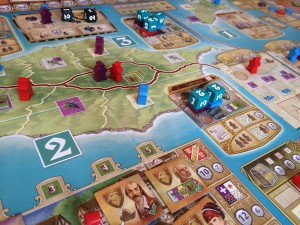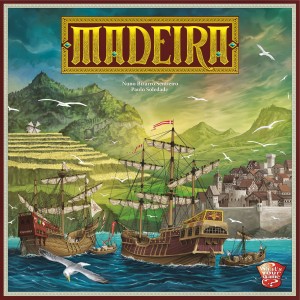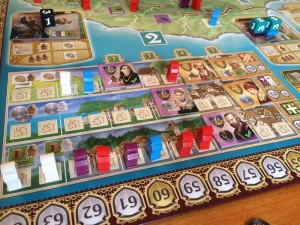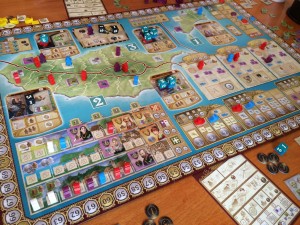Review: Madeira
Posted by James (admin) on December 4th, 2013
What’s Your Game have released some excellent games like Vasco de Gama and last year’s superb (and undeservedly less-known) Oddville. This year’s game, Madeira, is a very meaty eurogame – none of the game mechanics are complicated, but there are lots of them and they are quite interwoven.
THE GAME
Each round, players select a set of action dice which they place to use on the character’s actions, and potentially the building’s actions too. As well as cash and various resources, players have workers and ships which can be moved to various areas of the board. When triggered, workers on fields harvest that field’s resource, workers in colonies generate resources each round, and workers in cities can generate cash, food or bread. (Workers can also be in the city watch area.) Ships moved to markets and colonies can exchange resources for cash and special abilities respectively.
The board shows 5 buildings and some islands areas (located in 3 regions) and each building has a character on it too. The characters move during the game so are not always paired with the same buildings each round.
The game is played over 5 rounds. At the start of each round, each player selects a row on the Guild Board and takes the 3 dice next to it (which have already been rolled – values are 1, 2 or 3). Plus, the player selects one of the remaining Crown Request tiles in the same row – these earn points at the end of some rounds. The row selected also determines turn order for the next phase, plus it allows the player to reactivate some guild favours (special abilities) if they have any that match the row’s colour.
Next, players take turns placing one of their action dice on one of the 5 characters and taking the associated character action, i.e. move workers, move ships, buy guild favour tiles (re-usable special abilities if reactivated), use workers in city to generate cash/bread/wood , etc. However, the total number of dice that can be placed on each character is limited, plus placing a dice in a region whose value is higher than that of the dice costs bread too.

The main board a bit closer up showing some green action dice that have been placed on characters as well as workers on some island regions.
Players with workers in the City Watch area can remove one to place one of the black pirate dice instead of their own action dice, which gives that player an extra placement/action. When finished placing dice, a player can pass and select a remaining turn order position for the next turn (which each have a special benefit too).
Next, the building actions are resolved. Each player that placed at least 1 action dice (not pirate dice) on the character on a building gets to take that building’s action. i.e. gain bread, move workers to the city watch, etc. However, players need worker(s) on the appropriate areas to do these (and more workers gives a better effect).
Also, it costs cash to use a building’s action – the dice on the building are rolled and the cost is 10 cash minus the total of the non-pirate dice placed. In fact, players who placed an action dice here must pay the cost even if they don’t use the action. Any player not paying the cost gains a pirate counter (more if there are pirate dice on the building) which can cost players points at the end of the game; however, taking pirates is sometimes more desirable than paying the cash.
Next, players receive various resource incomes, as well as pay resources to feed their workers (bread) and maintain their ships (wood). Finally, at the end of the 1st, 3rd and 5th rounds, players score 1, 2 and 3 of their Crown Request tiles respectively. (Remember players pick/gain a Crown Request tiles at the start of each round when selecting dice.) Each tile describes how they are scored and are things like ‘score three ships’, ‘score 5 points for each active guild favour tiles you own’, ‘buy 1 point for 1 cash’, etc.
At the end of the game, players lose points based on their relative number of pirates (and additional points lost for each pirate over 20 too).
 THOUGHTS
THOUGHTS
Madeira is a game packed with decision-making that requires careful resource management as you’re almost always in need of multiple resources like money, bread and wood. You need a long-term plan with various short-term plans to get you there. The interwoven nature of the game mechanics makes this an interesting challenge too – I often thought I’d found a way to make my next move(s) better, only to realise my ‘great’ idea would actually make two other things worse.
Selecting which action dice to take can be more than simply ‘take the highest values’. The dice values do make a big difference (due to the bread required to place low values); however, setting turn order is important and players sometimes take a row to obtain a Crown Request tile that will score well (and/or reactivate Guild Favour tiles) – especially so later in the game.
The random pairing of characters with buildings makes for an interesting start to each round as you work out which character/buildings you will want (or will be able) to place your dice on to gain the actions that will combine well to further your plans. Getting your workers and ships in positions using character actions so they work well with the building actions straight afterwards is tricky (especially when you don’t know the cost of the building actions in advance, and/or if someone will get in your way) – but that’s part of the fun and challenge of the game.
Most player interaction is from ‘accidentally’ denying other players because your dice, ships or workers are in the way, or grabbing something before another player can; plus, you’re watching each other’s pirate total too. Even the number of dice placed on each character/building makes a difference as it alters the cost of using the building’s action – sometimes I found my dice placement influenced by whether other dice were there. So, whilst indirect, I definitely felt that the actions of others affected me.

The three cities. As the guild favour tiles are bought, more spaces are created for workers to be placed – which means the cities can generate greater amounts of cash, bread or wood.
As each player has different ways to score points (Crown Requests tiles) and different special abilities (Guild Favour tiles), they each have a slightly different perspective of the game even though they use the same locations. This is an aspect I always like in game. Having Crown Request tiles that match your strengths are key (so turn order can be very important and make it worth passing early to get first pick next round).
The random dice values and placement of characters on buildings each round, as well as the random placing of Crown Requests and Guild Favours, means there will be variety in replay.
I don’t really have any major negative thoughts about the game. There is some luck in the dice rolls that set the cost of a building action as these can cripple your plans if an action turns out to be expensive. Also, there is some luck if the dice you want are in the same row as a Crown Request tile that suits you (and/or if these give an early turn order position) – but then this can work the other way too and should even out over the game. Plus, there’s some luck if the characters and buildings you want to use are paired together in a round (plus if they;re in regions that suit you too). However, I found these luck elements to be acceptable and something you just have to react to or plan for.
Overall, Madeira is an excellent and challenging eurogame for gamers. None of the game mechanics are complicated in themselves, but there is a lot to balance and decide on. On the first play, the choices will likely seem a bit bewildering so you just have to try your best – but this is the same with any game that has depth and lots of choices. The board and pieces look great with clear iconography to guide things too.
You can read the rules and see more details about the game on Madeira’s web site: bga.me/madeira
James.
[Played with 3 players]



December 14th, 2013 at 8:08 am
I ordered this one directly from WYG so I’m trying to learn the rules in advance. Your review helps with this. Thanks!